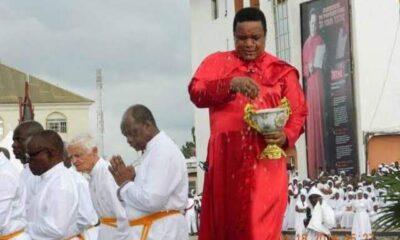Opinion
Beyond the barrel: The tourism imperative (2) By abiodun KOMOLAFE

According to the World Tourism Organization, tourism generates over $1 trillion in exports annually, creating millions of jobs and stimulating local economies.
Be that as it may, it is important to note that Nigeria’s vast growth and development opportunities are being overlooked due to a lack of vision and self-centeredness on the part of its successive leaders, ultimately hindering the greater good and benefiting only a privileged few.
This issue pervades all levels of government, from state to local, with authorities neglecting their duties to harness the potential of natural attractions for promotion and development.
The plight of Erin Ijesa Waterfall in Osun State is a story for another day!
For now, let’s delve into the essence of tourism in Ekiti State where, beyond the superficial allure of spectacle and entertainment, lies a profound narrative that whispers secrets of the human experience. As the world surrenders to its beauty, let us embark on a transformative odyssey that transcends borders, fosters empathy and understanding, and kindles the flame of economic prosperity for the communities that call the state home.
For Ekiti, Geographical Tourism showcases a diverse range of landscapes, including hills, waterfalls, caves, springs, valleys and mountains while Water-based Tourism attractions feature attractions like Ikogosi Warm Springs and Ureje Dam. Its diverse Spiritual Heritage is also reflected in its various religious sites, including Sacred Hills and Ancient Shrines.
Ecotourism in Ekiti showcases unspoiled natural attractions, rich cultural heritage and community-based initiatives while Environmental Tourism features natural wonders and its unique biodiversity, scenic landscapes and cultural heritage. The state is also a hub for Education Tourism, boasting an impressive array of institutions, including 6 universities, 3 polytechnics and other higher learning centers, catering for a population of 3.9 million.
Lets begin with Usi-Ekiti which holds a significant place in Nigerias history as the site of the first Catholic Mass in 1884, led by Father Julien Mourneau and his team of missionaries. This pivotal event not only marks the birthplace of Catholicism in Nigeria but also makes Usi-Ekiti the cradle of Catholicism in the country and a landmark in the spread of the faith.
Ori Oke Erio and Ori Oke Ido Ajinare, two sacred hills in Ekiti State, are culturally significant attractions offering stunning views, spiritual importance and a connection to God. These hills draw tourists for their historical values, panoramic vistas and eco-tourism opportunities, making them unique destinations for cultural and nature enthusiasts.
In Efon-Alaaye lies the final resting place of Apostle Joseph Ayo Babalola, founder of the Christ Apostolic Church (CAC). He died on Ori Oke Baba Abiye, Ede in Osun State on July 26, 1959 and his mortal remains were transported to Efon Alaaye for burial. Babalolas tomb has become a venerated pilgrimage site, attracting devotees seeking spiritual connection and inspiration.
In terms of traditional worship, Igede-Ekiti, for example, is the source of the Osun River. As such, it is sacred to the goddess Osun. To this end, devotees of Osun Osogbo must first visit this ancient town to pay homage and make offerings to the goddess before proceeding to Osogbo for the main celebration. This highlights the significance of Igede-Ekiti in the Osun Osogbo worship tradition.
Similarly, Eshu, or Esu, a respected Yoruba deity, has Ijelu-Ekiti as his ancestral home. As the guardian of crossroads, communication, and chaos, he maintains balance in nature and human affairs and protects the natural world a vital aspect of Yoruba spirituality and culture.
Osanyin, the deity of herbalism, healing and fertility, is from Ikole-Ekiti. As god of medicine and divination, Osanyin embodies nature’s power, guiding traditional healers and herbalists. His shrine in Ikole-Ekiti symbolizes the connection between nature, culture and spirituality.
In Yoruba mythology, Ogun, the god of iron and the patron of artisans, originated from Ire-Ekiti. His legacy inspires innovation, expertise and recognition of knowledge’s transformative power, influencing contemporary thought and human progress. The convergence of seven roads at Ire-Ekiti represents Ogun’s significance and his role in fostering connection and progress.
Ifa Agboniregun Shrine, dedicated to Ifa, the revered Yoruba deity of wisdom, divination and knowledge, is nestled in Oke Igeti, Ado-Ekiti. As a premier hub of Ifa practice, it has continued to inspire and guide generations, shaping the identity and traditions of the Ekiti people and the Yoruba race worldwide.
For vacationers and adventure seekers who care to know, Ikogosi Warm Springs is a unique natural wonder where warm and cold water flow together, yet maintain their distinct identities. Currently managed by a private firm, the resort is thriving, with over 17,000 tourists visiting in just the past three months alone, according to available data.
Not only that, Arinta Waterfalls in Ipole-Iloro is also a natural wonder with crystal-clear water cascading down a seven-step rocky terrain, creating scenic views and a cool ambiance. Its unique rock formations and cave are sources of cultural heritage and local economic growth, while preserving traditional practices and cultural identity. Another unique feature of this ancient site is that the more one shouts, the more the sound increases.
What about the Ero Dam in Ikun-Ekiti? Built in the 1940s, it is the 3rd largest dam in Nigeria, spanning 16 kilometers across 9 Local Governments. There are also Egbe Dam, formerly known as ‘Little Ose’, in Egbe-Ekiti; and Ureje Dam in Ado-Ekiti, with its unique 7 falls and a cave.
Like it or hate it, Afe Babalola University, Ado-Ekiti (ABUAD) stands out, featuring the largest planetarium in Africa and a state-of-the-art Teaching Hospital, which not only enhances Ekiti’s reputation as a hub for intellectual and scientific inquiry but also fosters social mobility, empowers local communities and contributes to the region’s socio-economic development, making Ekiti an attractive destination for students, researchers and academics seeking world-class educational experiences.
Abanijorin Rock on Old Iyin-Ekiti Road is a majestic natural wonder, embodying nature’s splendor and human spirituality. This ancient monolith features a massive size, unique shape and sacred significance, with a natural amphitheater, seven caves and an under-rock tunnel. History also has it that those warriors who fought for Ekitiparapo always converged on it for security meetings.
Ekiti State is a unique biodiversity hotspot, boasting 660 species of butterflies, the highest in Nigeria. It’s also home to the Monkey Colony in Ise-Ekiti, and serves as a refugee camp for chimpanzees in the Ise-Ekiti Forest. But that’s not all – Ekiti is also the only place in the world with a remarkable 42-headed palm tree, and thats located in Iloro-Ekiti.
Golgotha is also a revered sacred hill and cultural monument in Efon-Alaaye. Interestingly, it is one of two spots in Nigeria and the only one in the Southwest where one can walk in the cloud. Golgotha also houses the largest plantation in Southwest Nigeria.
Okorobo Festival in Ifaki-Ekiti celebrates fertility, prosperity and communal harmony. It exemplifies the connection between nature’s cycles and human existence. The festival showcases the towns rich heritage while promoting cultural identity and pride through rituals, masquerades and merriment.
Lots more! Theres still much to explore and discover!
From the foregoing, one can safely say that Ekiti States enigmatic landscape weaves a rich tapestry of identity and community, inviting exploration. And as Governor Biodun Oyebanji is reportedly striving to secure the future of the sector, a critical question lingers: can tourism balance preservation and progress, or will growth sacrifice Ekiti’s mystique? Again, only time will tell!
May the Lamb of God, who takes away the sin of the world, grant us peace in Nigeria!
*Concluded.
*KOMOLAFE wrote from Ijebu-Jesa, Osun State, Nigeria ([email protected]).
































